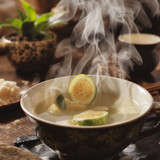

Starwest Botanicals
Organic White Tea Bags
White Tea Bags vs. Green Tea: Why They’re Different White tea and green tea come from the same plant—Camellia sinensis—but they’re made differently. That difference in processing is why white tea...
Polygonum tinctorium Ait., commonly known as Indigo Naturalis, is a traditional herbal medicine derived from the plant Polygonum tinctorium, also known as indigo or dyer's knotweed. It is renowned for its therapeutic uses in Traditional Chinese Medicine (TCM) and other traditional practices.
Why is Indigo Powder Blue?
Indigo Naturalis is blue due to the presence of a natural pigment called indigo. This pigment is derived from the plant Polygonum tinctorium and is responsible for the blue color of the herb.
Common Name: Indigo
Botanical Name: Polygonum tinctorium Ait., Indigo Naturalis
Chinese / Pin Yin Name: Qing Dai, Qing Dai Fen
Indigo Precautions: Do not use if pregnant or nursing. Do not use with abnormal liver function.
Indigo is a traditional Chinese medicinal herb to clear heat, remove toxicity, cool the blood and clear liver-fire.
Indigo Properties: Salty, Cold
Indigo Channels/Meridians: Liver, Lung, Stomach
Indigo Naturally Occurring Components: indigo, indigotin
Huang Lian Ban Lan Gen Xing Ren Zhi Zi
References
http://alternativehealing.org/indigo.htm
https://tcmwiki.com/wiki/qing-dai